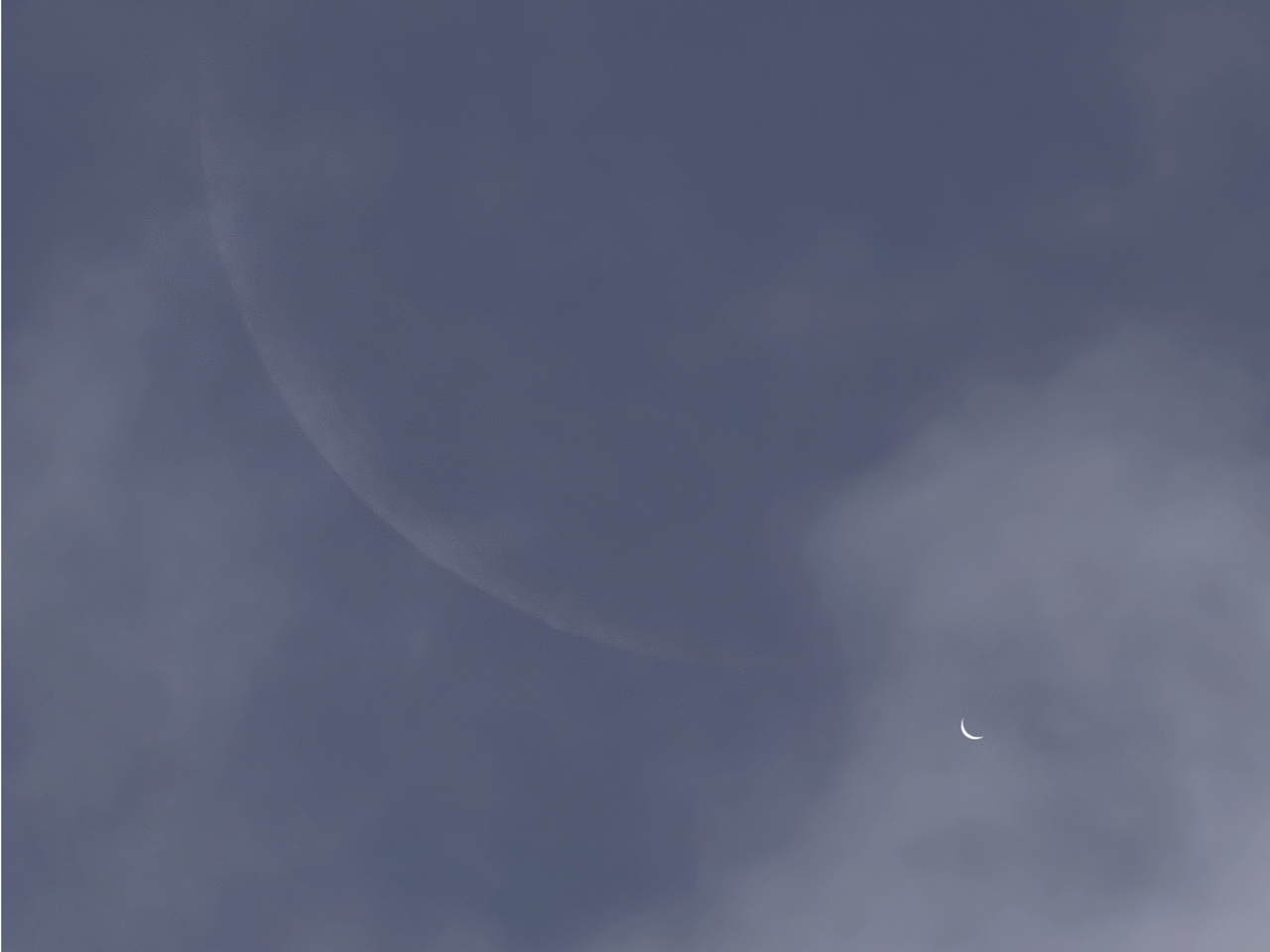Page 1 of 1
APOD: Two Views, Two Crescents (2010 Nov 11)
Posted: Thu Nov 11, 2010 5:09 am
by APOD Robot
 Two Views, Two Crescents
Explanation: Venus
Two Views, Two Crescents
Explanation: Venus rose in a glowing dawn sky on November 5th, just before the Sun. For early morning risers, its brilliant
crescent phase was best appreciated with binoculars or a small telescope. On that day the crescent Venus also appeared in close conjunction with
another lovely crescent that hugs the eastern horizon in planet Earth's morning skies, the waning
crescent Moon. The celestial photo-op is captured here from two locations.
Left, separated by less than a degree, the two crescents hover above a sea of clouds. The picture was recorded from an Alpine mountain pass not far from Turin, Italy.
On the right is a sharp telephoto view taken before an earlier sunrise, farther east in the
Alborz Mountains of Iran. In steady skies the slender Moon is still sliding toward Venus, the bright planet's
compact crescent just clearing the mountainous horizon. For now, the crescent phase of Venus remains easy to enjoy with binoculars in November's dawn skies. The first observations of the phases of Venus, made by
Galileo with his telescope in 1610, agreed with the predictions of the heliocentric
Copernican model of the Solar System.
[/b]
Re: APOD: Two Views, Two Crescents (2010 Nov 11)
Posted: Thu Nov 11, 2010 9:45 am
by León
Two crescents, two images, two worlds, beyond Persia, no clouds, closer to Artemis, the moon, here Italy, clouds, closer to Venus, common in Eastern Alborz Mountains, the Alps in the west, the sky itself.
Cielo desde Alborz arriba desde los Alpes abajo
The Ottoman Turks had adopted the symbol of the crescent (which then has become an emblem Muslims) to conquer Constantinople in 1453. Indeed, the city of Constantinople had as one of its emblems a crescent, the emblem of Constantinople originated in pre-Christian antiquity when Constantinople was a Greek colony named Byzantium. In that remote time the city of Byzantium was saved from being assaulted and taken during a night attack, thanks to which, by the moonlight, its advocates saw a gap in the ramparts, the Byzantine-pagans then decided to pay homage to the goddess Artemis Moon using its symbol (the crescent) as an emblem.
Re: APOD: Two Views, Two Crescents (2010 Nov 11)
Posted: Thu Nov 11, 2010 1:38 pm
by orin stepanek
Awesome!

The above image; and today's APOD photos.
Re: APOD: Two Views, Two Crescents (2010 Nov 11)
Posted: Thu Nov 11, 2010 4:16 pm
by Ann
Amazing image! It says something about the albedo difference between the Moon and Venus, too. Today's APOD is (are?) also great!
Ann
Re: APOD: Two Views, Two Crescents (2010 Nov 11)
Posted: Fri Nov 12, 2010 4:43 am
by suneve
This is awesome, but now I want to know where I need to look in the morning light to see venus. From, say, Oklahoma.
Re: APOD: Two Views, Two Crescents (2010 Nov 11)
Posted: Fri Nov 12, 2010 4:53 am
by Chris Peterson
suneve wrote:This is awesome, but now I want to know where I need to look in the morning light to see venus. From, say, Oklahoma.
Look to the east anytime during morning twilight. You can't miss it- Venus will be the brightest thing in the sky.
Re: APOD: Two Views, Two Crescents (2010 Nov 11)
Posted: Fri Nov 12, 2010 5:35 am
by Anne Noise
Stunning.
Re: APOD: Two Views, Two Crescents (2010 Nov 11)
Posted: Fri Nov 12, 2010 5:51 pm
by BMAONE23
suneve wrote:This is awesome, but now I want to know where I need to look in the morning light to see venus. From, say, Oklahoma.
If you have JAVA, the applet here will show the sky at night.
simply [change] the "Location" to your place in OK and alter the time of day.
http://skychart.skytonight.com/observin ... ychart.asp
Others on this board have other favored sites and programs but this one is straight foreward
 Two Views, Two Crescents
Two Views, Two Crescents

